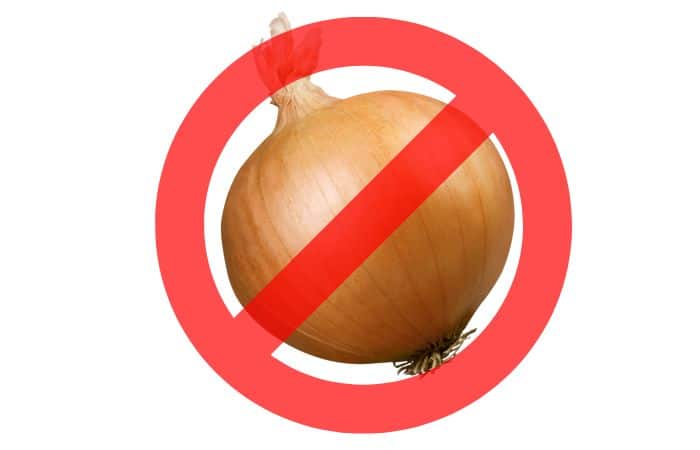Food allergies and intolerances have become increasingly prevalent in recent years, with many individuals experiencing adverse reactions to certain foods. Among the many potential allergens, onions have emerged as a common culprit for some people. What makes onion allergies or intolerances particularly intriguing is that some individuals may actually crave onions or foods containing onions, despite experiencing symptoms such as itching, hives, abdominal pain, or digestive issues. Could these cravings be a sign of a problem?

Understanding Onion Allergies and Intolerances
Onions, a staple ingredient in many cuisines around the world, are known for their distinctive flavor and aroma. However, for some individuals, onions can trigger adverse reactions in the form of allergies or intolerances.
Onion Allergy
An immune system response triggered by the proteins found in onions. When the immune system mistakenly identifies these proteins as harmful, it releases histamines and other chemicals that lead to allergic symptoms.
Onion Intolerance
A non-immune response to onions, usually due to difficulties in digesting certain compounds found in onions, such as fructans or sulfur compounds. This can result in digestive discomfort and other symptoms, but does not involve the immune system.
Common Symptoms of Onion Allergy and Intolerance
Onion allergy symptoms may include itching, hives, swelling of the lips or tongue, nasal congestion, difficulty breathing, abdominal pain, diarrhea, nausea, and vomiting. In severe cases, anaphylaxis, a severe and potentially life-threatening allergic reaction, can occur.
Onion intolerance symptoms may include bloating, gas, abdominal pain, cramping, diarrhea, or other digestive discomfort.
Severity of Onion Allergies
Onion allergies can vary in severity, with some individuals experiencing mild symptoms and others experiencing severe reactions, including anaphylaxis.
Anaphylaxis is a severe allergic reaction that can be life-threatening and requires immediate medical attention. Symptoms may include difficulty breathing, swelling of the face, lips, or tongue, rapid or weak pulse, hives, nausea, and vomiting.

Factors Contributing to Onion Allergies and Intolerances
The development of onion allergies and intolerances can be influenced by various factors, including genetic, immune, gut health, and environmental factors. Understanding these factors can provide insights into why some individuals may experience cravings for onions despite having adverse reactions to them.
Genetic Factors
If you have a family history of food allergies or other allergic conditions, you may be at a higher risk of developing an onion allergy or intolerance. Genetic factors can play a role in how the immune system responds to allergens, including those found in onions.
Immune System Responses
Hyperactive Immune System
Some individuals may have a hyperactive immune system that reacts excessively to proteins found in onions, leading to allergic reactions. This can be influenced by genetic factors or other environmental factors that trigger immune responses.
Autoimmune Diseases
Individuals with a history of autoimmune diseases, where the immune system mistakenly attacks the body’s own tissues, may be more susceptible to developing food allergies or intolerances, including those related to onions.
Gut Health
Leaky Gut Syndrome
Leaky gut syndrome, a condition where the permeability of the gut lining is compromised, can lead to the passage of undigested food particles, including onion proteins, into the bloodstream. This can trigger an immune response and contribute to the development of onion allergies or intolerances.
Gut Microbiota
The balance and diversity of gut microbiota, the trillions of bacteria living in the gut, can play a role in immune regulation and digestion. Disruption of the gut microbiota balance, such as dysbiosis, may increase the risk of developing food allergies or intolerances, including those related to onions.
Environmental Factors
Occupational Exposure
Occupational exposure to onions, such as in chefs or food industry workers who handle onions regularly, may increase the risk of developing an onion allergy or intolerance due to repeated exposure to allergenic proteins.
Environmental Allergens
Exposure to other environmental allergens, such as pollen or dust, may trigger immune responses and increase the risk of developing food allergies or intolerances, including those related to onions.
Managing Onion Allergies and Intolerances
If you suspect that you have an onion allergy or intolerance, it’s important to take steps to manage your condition to prevent adverse reactions and ensure your overall health and well-being. Here are some strategies for managing onion allergies and intolerances:

Avoidance of Onion
- The most effective way to manage an onion allergy or intolerance is to avoid consuming onions in any form, including raw, cooked, or processed onions, as well as onion-containing foods or products. Carefully read food labels and ingredient lists to identify hidden sources of onions.
- Be cautious when dining out or eating at social gatherings, as onions may be present in various dishes and condiments. Ask about ingredients and food preparation methods to avoid cross-contamination.
- Educate yourself about alternative flavorings and ingredients that can be used in place of onions in cooking, such as herbs, spices, and other vegetables, to maintain the desired taste and aroma in your meals.
Medication and Emergency Preparedness
- If you have a history of severe onion allergies, talk to your healthcare provider about carrying an epinephrine auto-injector (e.g., EpiPen) in case of a severe allergic reaction. Learn how to use it properly and have it readily available at all times.
- Work with your healthcare provider to develop an emergency action plan for managing onion allergies or intolerances, including knowing the signs and symptoms of anaphylaxis and when to seek immediate medical attention.
Gut Health and Immune Support
- Maintain a healthy gut by consuming a well-balanced diet rich in fiber, fruits, vegetables, and probiotic-rich foods, which can promote gut health and immune function.
- Consider working with a registered dietitian or healthcare provider to identify and address any gut health issues, such as leaky gut syndrome or dysbiosis, that may contribute to onion allergies or intolerances.
Allergy Testing and Monitoring
- If you suspect an onion allergy or intolerance, consider undergoing allergy testing, such as skin prick tests or blood tests, to confirm the diagnosis and identify other potential allergens or intolerances.
- Regularly monitor your symptoms and reactions to onions or onion-containing foods to better understand your triggers and manage your condition effectively. Keep a food diary to track your diet and symptoms, and share this information with your healthcare provider.
Educating Others
- Educate your family, friends, and caregivers about your onion allergy or intolerance, and the severity of your condition. Teach them how to recognize the signs and symptoms of an allergic reaction and how to respond in an emergency situation.
- Raise awareness about onion allergies and intolerances within your community to promote understanding and support for individuals with these conditions.
Can Cooking or Processing Onions Change Their Allergenic Properties?
Cooking or processing onions can potentially change their allergenic properties. In some cases, the proteins in raw onions that trigger allergic reactions may be denatured or broken down during cooking or processing, resulting in reduced allergenicity. However, it’s important to note that this may not always be the case, as the allergenicity of onions can vary depending on the individual and the specific cooking or processing methods used.
For some individuals with onion allergies or intolerances, even cooked or processed onions may still trigger allergic reactions. Heat may not completely eliminate the allergenic proteins in onions, and some individuals may still react to even small amounts of cooked or processed onions. Therefore, it’s essential for individuals with onion allergies or intolerances to exercise caution and avoid consuming any form of onions, whether raw, cooked, or processed, to prevent allergic reactions.
It’s also worth mentioning that cooking or processing methods can vary, and factors such as time, temperature, and processing techniques can impact the allergenic properties of onions. Some cooking methods, such as roasting or frying, may retain more allergenic proteins compared to other methods like boiling or microwaving. Therefore, it’s important to consult with a qualified healthcare professional for personalized advice on whether or not to consume cooked or processed onions based on your specific onion allergy or intolerance.
Are There Other Foods that Cross-React with Onions and May Cause Similar Allergic Reactions?
There are other foods that can cross-react with onions and may cause similar allergic reactions. Cross-reactivity is a phenomenon in which the proteins in one food can trigger an allergic reaction in individuals who are allergic to a different but related food.

Onions belong to the Allium family, which includes other common vegetables like garlic, leeks, chives, and shallots. These foods share similar proteins with onions and can potentially cross-react in individuals who are allergic to onions. This means that if you have an onion allergy, you may also be at risk of developing allergies or intolerances to other Allium family vegetables.
In addition to Allium family vegetables, some individuals with onion allergies or intolerances may also experience cross-reactivity with other foods that share similar proteins or have similar allergenic properties. For example, some individuals who are allergic to onions may also experience cross-reactivity with other foods from the lily family, such as asparagus, and some individuals who are allergic to raw onions may also react to other raw foods like raw garlic or raw shallots.
Conclusion
Onion allergies and intolerances can be challenging to manage, but with proper understanding, preparation, and support, individuals with these conditions can effectively prevent adverse reactions and maintain their health and well-being. By being vigilant about avoiding onions and onion-containing foods, carrying necessary medications like epinephrine auto-injectors, supporting gut health and immune function, undergoing allergy testing and monitoring, and educating others, you can take proactive steps towards managing your onion allergy or intolerance.
It’s crucial to work closely with your healthcare provider to develop a personalized management plan that fits your specific needs and lifestyle. Remember to always read food labels carefully, communicate your condition to others, and seek medical advice if you suspect an onion allergy or intolerance.








